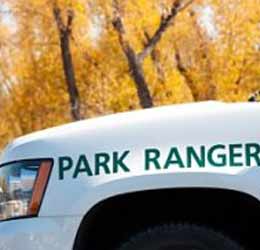Seasonal Park Ranger Jobs
Park rangers may have the coolest job in the world. They work outdoors in the National Park system. They may call Maine’s Acadia, Florida’s Biscayne, New Mexico’s Carslbad Caverns, Oregon’s Crater Lake, or North Carolina’s Great Smoky Mountains their home for the season or year.
Every day is exciting and as a park ranger you never really know what to expect. You may have a run in with a giant moose, give directions to a confused hiker, search and rescue a hurt climber, give an informational program to park visitors, spend time in the visitor center, explore the woods so you can lead a new hike, or cite a dog owner for not following leash laws.

The typical day lasts eight hours. It may start at 5 in the morning or it may start at 2 in the afternoon. You really won’t know until the day starts. It keeps you on your toes all the time. The beauty of the job is that you get to live in a national park – a place where others come to visit is literally your home.
Working, as a seasonal park ranger is one of the most popular Park Service jobs, so be ready for some fierce competition. There are also quite a few requirements that you must meet. As with any job for the federal government you must be 18 years old or older, a US citizen, and in good physical shape, but park rangers must also be able to pass a drug test for law enforcement positions, have a valid driver’s license, and have corrected 20/20 vision. Your application will be stronger if you also have first aid and CPR training and experience or training in search and rescue.
There are three types of park rangers – interpretive rangers, law enforcement rangers, and general park rangers. Interpretive rangers work with park visitors to teach them about the park’s historical, cultural, and natural surroundings. Law enforcement rangers deal with emergencies, patrol the parks, and write tickets.
They must be 21 years old and have completed an accredited National Park law enforcement course. General rangers cover all aspects of park life. They work as law enforcement and informative rangers. Their role in the park is to do pretty much everything – collect fees, forestry management, backcountry duties, communications, and anything else that comes up.
Pay scales are adjusted periodically and vary depending on grade and step. For the most up to date pay information visit the government’s website as they are required to post it. Accommodations are often subsidized or even provided if you’re working in the backcountry. Plus you get lots of government benefits.
The hardest part of becoming a park ranger is competing with the other talented applicants. But if you’re lucky enough to be one of the chosen ones, you’ll love every minute of your job.
Park Ranger Pay Information
